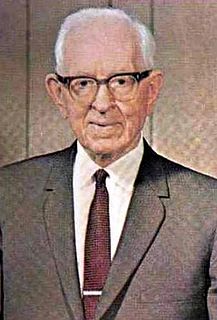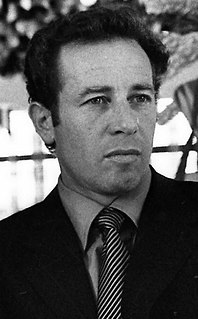A Quote by Malcolm Gladwell
We have the kind of self-made-man myth, which says that super-successful people did it themselves.
Quote Topics
Related Quotes
Fear is the tool of a man-made devil. Self-confident faith in one's self is both the man-made weapon which defeats this devil and the man-made tool which builds a triumphant life. And it is more than that. It is a link to the irresistible forces of the universe which stand behind a man who does not believe in failure and defeat as being anything but temporary experiences.
But myth is something else than an explanation of the world, of history, and of destiny. Myth expresses in terms of the world - that is, of the other world or the second world - the understanding that man has of himself in relation to the foundation and the limit of his existence. Hence to demythologize is to interpret myth, that is, to relate the objective representations of the myth to the self-understanding which is both shown and concealed in it.
There is a historic strain of dominion theology which says, taking its references from the Psalms, that man is made just a little lower than God, and that we are the crown of creation. That interpretation has come at the expense of the one that says when God, in the story of Noah, intervened to save human life against the flood, against the acts of nature, He did not stop with human beings. He made sure that every kind of animal was represented twice on that ark.
But the myth of power is, of course, a very powerful myth, and probably most people in this world more or less believe in it. It is a myth, which, if everybody believes in it, becomes to that extent self-validating. But it is still epistemological lunacy and leads inevitably to various sorts of disaster.
As naturally as the ruled always took the morality imposed upon them more seriously than did the rulers themselves, the deceived masses are today captivated by the myth of success even more than the successful are. Immovably, they insist on the very ideology which enslaves them. The misplaced love of the common people for the wrong which is done to them is a greater force than the cunning of the authorities.
To do well those thing which God ordained to be the common lot of all man-kind, is the truest greatness. To be a successful father or a successful mother is greater than to be a successful general or a successful statesman... We should never be discouraged in those daily tasks which God has ordained to the common lot of man... Let us not be trying to substitute an artificial life for the true one.
America is the world's living myth. There's no sense of wrong when you kill an American or blame America for some local disaster. This is our function, to be character types, to embody recurring themes that people can use to comfort themselves, justify themselves and so on. We're here to accommodate. Whatever people need, we provide. A myth is a useful thing.
I seem to thrive by destroying the last thing I did, in a kind of cartoon Nietzsche way. Emerson says in "Experience" something like "every ultimate fact soon becomes the next in a series." The self feels more real when you are destroying things you've made than when you are paying them homage. That's the good news about being self-destructive. The bad news, I feel I don't need to deliver.



































